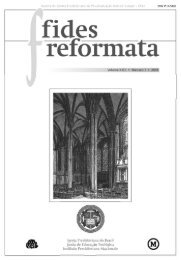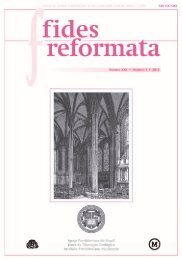Fides 22 N2
Um publicação do Centro Presbiteriano de Pós-graduação Andrew Jumper.
Um publicação do Centro Presbiteriano de Pós-graduação Andrew Jumper.
You also want an ePaper? Increase the reach of your titles
YUMPU automatically turns print PDFs into web optimized ePapers that Google loves.
ELIAS MEDEIROS, THE REFORMERS AND MISSIONS<br />
Tucker regarding the reformers and “missions.” This present article continues<br />
the study of the subject in the previous article (Part 1), highlighting Warneck’s<br />
arguments against the apparent “silence” of the reformers, and adding final<br />
comments on the main arguments of the other mission historians and on their<br />
own silence regarding the necessary documentation to support their claims<br />
against the reformers.<br />
1. WARNECK’S ARGUMENTS AGAINST THE SILENCE OF<br />
THE REFORMERS<br />
Most of Warneck’s critiques are directed toward the sixteenth-century<br />
Lutheran theologians, especially Martin Luther. 1 Ten out of sixteen and a half<br />
small print pages on the subject are critiques of Martin Luther (1483-1546) and<br />
Philip Melanchthon (1497-1560). Warneck dedicates one page to Martin Bucer<br />
(1491-1551) and Ulrich Zwingli (1484-1531), one and a half pages to John<br />
Calvin (1509-1564), one and a half pages to Adrianus Saravia (ca. 1532-1613),<br />
and a half page to Theodore Beza (1519-1605).<br />
Throughout his chapter dealing with the Reformation, Warneck supports<br />
several verdicts. He clearly states that the reformers in general, with the exception<br />
of Adrianus Saravia, were devoid of any “missionary action,” lacked<br />
“missionary zeal,” were strangely silent on “the recognition of the missionary<br />
obligation,” darkened “the permanent missionary task of the church,” did not<br />
speak of “foreign mission work,” had “no proper missionary ideas” due to their<br />
eschatological position and their concept of history, understood “the missionary<br />
commandment [of Matthew 28:20]” as being “valid only for the Apostles,”<br />
knew nothing about “the duty of instituting missions,” did not recognize “such<br />
a duty,” and assumed that “a special institution for the extension of Christianity<br />
among non-Christian nations, i.e. for missions, is needless.” 2<br />
Warneck’s arguments can be classified under biblical, theological, and historical<br />
categories. In the biblical category is the interpretation and the implications<br />
of the so-called missionary texts, Matthew 28:18-20; Mark 16:15; Luke 24:46-48;<br />
John 20:21; Acts 1:8; 12:21; 26:16-18 (including the views on the apostolate).<br />
The theological category includes the doctrines of predestination, eschatology,<br />
and the sovereignty of God: “The kingdom of Christ is neither to be advanced<br />
1 Numerous Lutheran scholars have already addressed the issue of Martin Luther and missions.<br />
See, for instance, Klaus Detlve Schulz, “Lutheran Missiology of the 16 th and 17 th Centuries,” in Lutheran<br />
Synod Quarterly 43:1 (March 2003), 4-53; Ingemar Öberg, Luther and World Mission: A Historical and<br />
Systematic Study with Special Reference to Luther’s Bible Exposition, translated by Dean Apel (Saint<br />
Louis: Concordia Publishing House, 2007); James A. Scherer, “Luther and Mission: A Rich but Untested<br />
Potential,” in Missio Apostolica: Journal of the Lutheran Society of Missiology 2 (May 1997): 17-24,<br />
reprinted in Luther Digest: An Annual Abridgement of Luther Studies 5 (1997): 62-68; Rhonda J. Hoehn,<br />
“Martin Luther and Mission....”<br />
2 Gustav Warneck, Outline of a History of Protestant Missions from the Reformation to the Present<br />
Time. 3 rd ed. New York: Fleming H. Revell, 1906, 8-23.<br />
140




